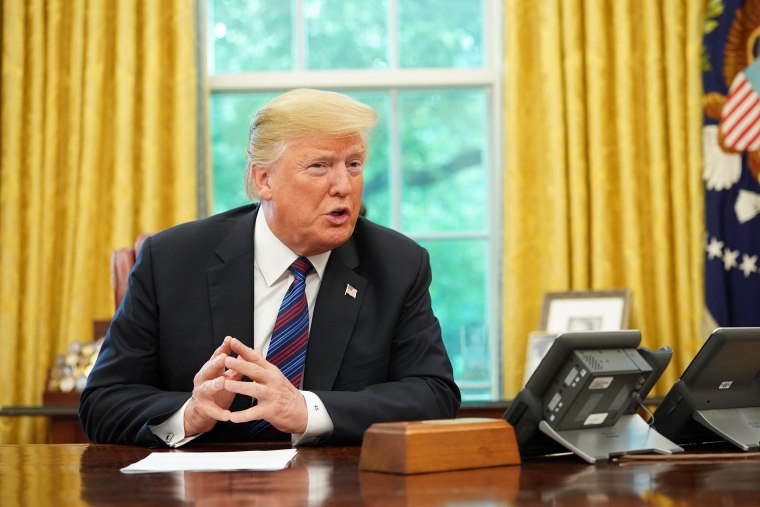It was a couple of months ago when, according to multiple independent reports, Donald Trump received an exceedingly unpleasant briefing from his 2020 campaign team. The president's aides presented him with data showing him trailing Joe Biden, which led Trump to reportedly "erupt" and threaten to sue his campaign manager, Brad Parscale.
After the incident, Parscale reportedly brought polling numbers to the Oval Office "that were more positive for Trump, and the president seemed in a far better mood."
The moral of the story wasn't subtle: Trump only wants to see survey data that tells him what he already believes.
The trouble for the president is that major news organizations continue to do their own polling, and they're not especially concerned with whether Trump finds the results reassuring or not.
With this in mind, the president peddled a strange conspiracy theory on Fox Radio last week, arguing, in reference to major pollsters, "I don't even think they go out and poll. I think they sit at a desk and say, 'Give this number, give that number.'"
Among other things, the line of attack was also ironic, given that Trump has been known to assign himself his own approval rating.
Yesterday, he went further.
President Trump released an analysis from a pollster allied with his campaign on Monday seeking to knock down recent surveys showing him trailing former Vice President Joe Biden in the race for the White House. Trump tweeted out the analysis by the firm McLaughlin & Associates, holding it up as a sign that recent polls from the likes of CNN, NBC and The Wall Street Journal had been tainted by political bias and shaky methodology.
On Twitter, the president claimed he "retained" John McLaughlin's services for this anti-polling endeavor. Trump added that he believes major American news organizers are conspiring against him, releasing "fake" results in order to "suppress" enthusiasm among his followers.
Before even considering the nature of the truly unhinged conspiracy theory, it's worth pausing to appreciate the broader context. The United States is currently dealing with a deadly pandemic; millions have taken to the streets to demand social justice; and unemployment has reached levels unseen since the Great Depression. It's against this backdrop that Trump is seeing polls showing his support slip -- a fact he finds so ridiculous that he's hired a pollster to go after other pollsters.
One would like to think the president has better uses for his time and attention.
Let's also note that while Trump touted John McLaughlin as "highly respected," McLaughlin is actually "notorious for producing rosy polling data on behalf of his clients." Reflecting on the pollster's record from the most recent national elections, the New York Times' Nate Cohn described McLaughlin as "perhaps the worst pollster of 2018." (Cohn added, "And look, let's be honest. The record doesn't get prettier if you look farther back.")
But even if we put aside these relevant details, Trump's entire pitch is just pitiful. Major American news organizations are publishing made-up polls? While engaging in a mass conspiracy with rival outlets? All in the service of suppressing voter enthusiasm five months before Election Day?
If a relative emailed you such nonsense, you'd likely start reaching out to other relatives to make sure he's all right.
Perhaps most importantly, the McLaughlin memo the president is so excited about is based on the idea that pollsters are deliberately under-counting Republican voters. The subject line on the memo reads, "Skewed Media Polls." The pollster proceeded to use the word "skew" more times in four paragraphs.
If the word sounds familiar in this context, it's because Republican eagerly embraced poll denialism in 2012, touted at the time the need to "unskew" survey data.
Remind me: how'd that work out for the GOP and its national ticket?

